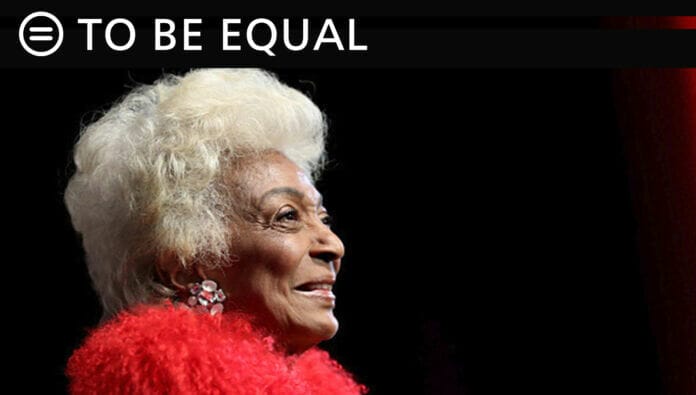
TO BE EQUAL, by Marc H. Morial, President and CEO, National Urban League
“Everybody, come quick, come quick; there’s a black lady on television and she ain’t no maid!” — Whoopi Goldberg
Fed up with racist insults on set and longing to make her way as a Broadway musical star, Star Trek actress Nichelle Nichols already had given showrunner Gene Roddenberry her letter of resignation when she met Martin Luther King, Jr., at a Beverly Hills fundraiser.
He implored her not to quit, telling her that Star Trek was the only television show he and his wife allowed their three young children to stay up and watch. “For the first time on television, we will be seen as we should be seen every day, as intelligent, quality, beautiful, people who can sing dance, and can go to space, who are professors, lawyers. If you leave, that door can be closed because your role is not a Black role, and is not a female role; he can fill it with anybody — even an alien.”
Nichols retrieved her resignation letter – Roddenberry had torn it into pieces, and went on to inspire not only a generation of entertainers and artists but real-life astronauts as well. Before launching into history aboard Space Shuttle Endeavour in 1992, Mae Jemison, the first Black woman to travel into space, called Nichols to thank her for the inspiration.
Nichols, who passed away last month, portrayed a character who exuded intelligence, glamor, competence, and an authority that was respected by men and women of all backgrounds at a time when such roles were rare not just on television, but in American life.
“Black people of all abilities and professions were still being relegated to the corners of restaurants, hotels and offices,” journalist Stacy China wrote in the New York Times. “Black women, if ever mentioned in the larger media, were portrayed as either loud, undignified troublemakers or genial, overweight maids and nannies who supposedly delighted in doting on white folk’s children.
“Out of this madness, Uhura appeared.”
Representation for people of color in the entertainment industry is a founding principle of the Martha’s Vineyard African American Film Festival, celebrating its 20th anniversary this week. The National Urban League continues to be an active participant in the festival, hosting and participating in panels and discussions, including a conversation with filmmaker Andre Gaines, whose film, After Jackie, tells the story of the second wave of Black baseball players after Jackie Robinson – Bill White, Curt Flood and Bob Gibson – “who put their lives on the line to integrate baseball and demand a fairer, more inclusive America for African American athletes around the world.”
This year marks the 50th anniversary of a Supreme Court ruling known as the Curt Flood decision that opened the door for free agency in Major League Baseball. The film has re-ignited the push to induct Flood into the Hall of Fame.
“One of the powers of this festival, and the work that [festival organizers Stephanie and Floyd Rance] have done, is to lift up stories that too often have been lost in the flow of time,” said former President Barack Obama, producer of another festival entry, Descendant, a documentary about the descendants of the slave ship Clotilda. “Because we believe that everybody’s stories matter. Everybody’s got a sacred story that motivates us, moves us. It’s not just a matter of nostalgia. It powers us into the present and the future.”
Visibility for Black history, for the diversity and richness of Black experiences, are essential in breaking down Black stereotypes and shattering the myth of white supremacy.
“There is still a very long way to go in the representation of Black women and femmes on modern-day screens and stages, but Nichelle played a pivotal role in shifting our stories out of the lives of servants and sidekicks.” wrote actress Celia Rose Gooding, who reprises the role of Uhura in a Paramount+ series. “She taught us we all deserved to have our dreams come true because our dreams mattered, whether we were officers with a hand in protecting the future, space explorers, dancers who bring smiles to their spectators, or those of us with songs in our hearts we must set free.
“And she taught us we deserved representation and the preservation of our futures not only because of what we could do for the world, but simply because it was our God-given right.”
Marc H. Morial is President and CEO of the National Urban League. He was a Louisiana State Senator from 1992-1994, and served as mayor of New Orleans from 1994 to 2002. Morial is an Executive Committee member of the Leadership Conference on Civil Rights, the Black Leadership Forum and Leadership, and is a Board Member of both the Muhammad Ali Center and the New Jersey Performing Arts Center.

